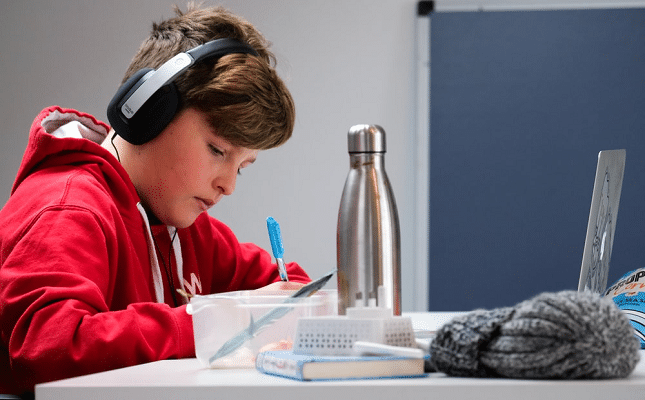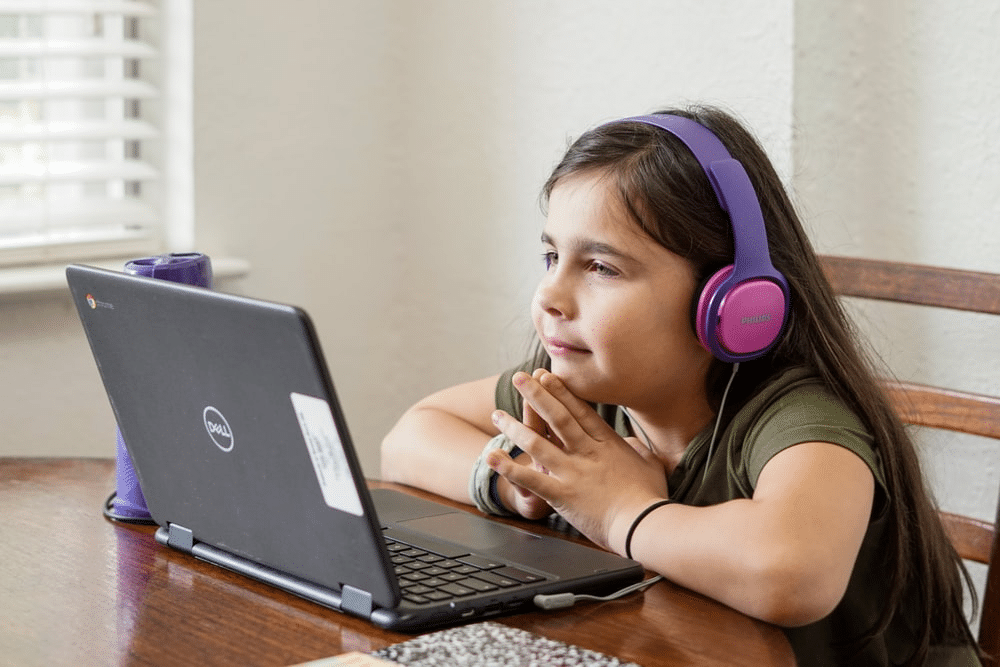
Convenience, immediacy, and individualised experiences are gradually becoming the new norm for parents and their children. As a result, online schooling has grown substantially over the last few years. Even before the impact of COVID-19, there was a 65% increase in children being homeschooled in the UK between 2009 and 2015.
The concept of virtual learning is still relatively new, but it has gained widespread recognition amidst the pandemic. Being thrust into this new world and adjusting to it was definitely a difficult process. However, once parents understood the basics, they came to appreciate the benefits of distance learning high school online. Students in Europe, specifically those in lower school, can benefit a lot from such virtual tools. Let’s take a look.
1. Self-paced learning
A significant benefit of online schooling is that students can start learning at their own pace. Most of us acknowledge that every child is different, which means their interests, intelligence, rate of retention, and level of understanding are different too. Unfortunately, in conventional schools, students are expected to learn lessons and finish classwork at the same pace as their peers.
Some students require more time, while others need more guidance; some learn better by listening, while others understand through reading.
The obvious solution is online schooling, which is a mix of self-paced work and scheduled activities. Students can enjoy studying at a comfortable pace.
2. Added Flexibility and Independence
Speaking of self-paced, another by-product of online schooling is added flexibility and independence. Research shows that children struggle with maintaining focus for an extended period of time, yet most students in lower school have back-to-back classes with hardly any breaks. This, in turn, affects the output of their work, and many are unable to complete the tasks at hand.
On the contrary, taking breaks enhances improves their performance. Regular short intervals help students—specifically the younger ones—focus better, manage stress, and increase productivity. Online schooling gives them this flexibility, letting students choose when to do their school work and when to relax. They become more independent, and by taking ownership, students are further motivated to complete their work.

3. 24/7 Access to an Online Library of Education Resources
Another perk of online schooling is that students can readily access all the information. Resources like lesson recordings, presentations, worksheets, key announcements, and homework details are all readily available for students if they need them.
With easy accessibility to notes online, the children will listen more attentively instead of frantically making notes. In addition to a database, some education portals have advanced features that allow students to submit their work online or receive reminders about deadlines.
With everything documented, a parent can easily check the status of their child’s performance too. They can keep up with the coursework, paper submissions, and get almost immediate feedback on assignments. A clear picture of the child’s academics enables parents to take corrective actions early on. It will also be easier to teach children through the available resources.
4. Fewer Absences from School
In a conventional setting, if a child falls sick or gets injured, they are forced to skip school. Then begins the tedious process of getting the lesson plan, classwork, and homework from fellow students and teachers. The pressure to catch up is high, and trying to cover the missed assignments on top of the new schoolwork can be taxing for both the child and parents. With an online learning structure, this obstacle can be eliminated altogether.
Students can simply open up their online portal to access the day’s recorded lesson and homework. Even if they have missed a few days of school, catching up won’t be a problem as they can attend classes at home and do the work once they have rested. If a recording doesn’t suffice, then an online session with the teacher is easier to arrange than an in-person one. The convenience offered by online schooling is immeasurable and provides excellent support for learning.
5. No Longer Overbooked
For the past few years, students being overbooked throughout the day has become common practice. Club meetings, sports, extracurricular activities, after-school revision classes, or even private tutoring sessions take up most of their day. Additionally, they need to take time out to complete their school homework and projects, leaving them very little time for other things.
A jam-packed schedule like this can be overwhelming and challenging for the child, especially if they’re under pressure to compete with classmates. As a result, they are more likely to experience anxiety while their school performance continues to fall. Online schooling is a great alternative to this model. It gives your children time to relax while making sure the foundation of their education is strong. As a result, it’ll become easier for them to manage new interests and activities alongside studies once they reach upper school.

6. Increased Parental Involvement
Since conventional schooling requires students to receive education in a place separate from their home, there’s a disconnect between the two parties. As a result, most parents are unaware of what their children are learning.
Online schooling, on the other hand, effectively brings the teacher home, allowing parents to get more involved in their children’s education. Increased communication with teachers is a bonus.
Parents are now aware of what their children learn, more mindful about deadlines, and are better able to assess the quality of teaching. They can also provide help with coursework. This type of support and encouragement significantly contributes to the child’s achievements. Family involvement plays a critical role in improving student’s academic performance, and online schooling facilitates this.
7. Fewer Obstacles and Distractions
As class sizes increase, so do distractions. As a result, many students tend to lose focus, negatively affecting their studies. Moreover, pre-teen years can be difficult for students. Encountering bullies and negative peer pressure during this stage in life can damage a child’s mental health. This then sets the stage for possible behavioural issues and social anxiety in the long run.
Online schooling removes these distractions, and shields children from the effects of bullying and unhealthy peer pressure. Students can now do both; study in a healthy, comfortable space while socialising with friends outside the learning environment.
Classes go more smoothly as teachers don’t have to address disruptive behaviour. They can now put all their attention into supporting and teaching students.

8. Increased Class Participation
Susan Cain, the author of ‘Quiet: The Power of Introverts in a World That Can’t Stop Talking’ elaborated on this in her TED Talk. She believes that schools are mostly designed for extroverts, which is why they tend to thrive in a conventional school setting. Introverts, however, are more active in low-key environments. In terms of academics, they perform even better in quieter settings.
A conventional school environment can be tough on passive listeners and introverts. Extroverts are more inclined to speak, participate, and volunteer for activities, whereas introverts don’t get the same chance. Online schooling puts both categories of children on equal footing. It encourages passive listeners to join in class discussions while extroverts will continue to participate and, in fact, learn even more through diverse opinions.

9. Individualised Schedules
Most parents and students choose online schooling because of the freedom it offers them in their schedules. A conventional institute does not provide the same liberty. In-classroom school goers have their daily routines planned out in accordance with their school commitments. This prevents them from exploring other hobbies like tennis, horse-riding, fencing, piano playing, or ballet. Many students are also interested in going national and doing these activities professionally, but a conventional school won’t allow it.
For such families, online schooling is a better alternative. In particular, student-athletes and performers with demanding schedules can really benefit from this facility. They are now free to pursue outside interests while keeping up with their education by accessing online resources and coursework.
10. Solution for Families Constantly on the Move
Many families move around a lot for work which can negatively affect children’s education. Adjusting to a new environment, teachers, fellow pupils, curriculum, and culture is mentally and physically exhausting. Not only does the child face difficulty in learning, but they may also exhibit behavioural issues on account of bullying and lack of friends. In this case, distance learning could be your solution.
Enrolling your children in an online institute is equivalent to having a constant school regardless of where the family travels. Students don’t have to worry about adjusting to a new place, making new friends, and building their social life from scratch.

11. Active Students
Most students need to wake up early morning for their classes. This drastically impacts their sleeping habits, making them sleepy during class. As a result, they aren’t active and less conducive to learning. For a productive day, sleep is integral. Experts recommend at least 9-12 hours of sleep for children between the ages of 6 and 12 and 10-13 hours for children below 5 years.
Unfortunately, not many students get this amount of sleep, as a study by the British Nutrition Foundation found that 1 in 3 primary school students were getting less than 9 hours of sleep at night everyday.
Due to its flexibility, online schools add 1 to 2 hours of sleep by removing the need to commute to a physical school and get dressed. Getting more sleep correlates with improved grades.

12. Comfortable Learning Experience
In conventional schools, the concept of comfort is still relatively new, and most are unable to provide basic comfort-related amenities like soft seating. Virtual schooling prevents this by allowing students to study in an environment that gives them mental and physical comfort. This, in turn, has a positive impact on their learning, creativity, and productivity.
The Next Step
In conclusion, online learning offers several advantages for young students and their parents. If you’re ready to take the next step and enrol your children in a Virtual school online UK, then thorough research is essential.
Cambridge Home School provides quality education across four schools, including Primary Prep and Lower School. Recognised for helping students secure top grades, the institution puts its students’ academic growth and holistic development first. By balancing both components of a student’s life, our MA/PhD qualified subject specialist teachers help students achieve high levels of academic success. Moreover, we also offer one-on-one success coaching and pastoral support to ensure children are happy and successful achievers.
We provide quality British virtual school online in UK education across four schools: Primary Prep/Key Stage 2 (ages 8 to 10), Lower School/Key Stage 3 (ages 11 to 13), Upper School/IGCSEs (ages 14 to 16), and Sixth Form/AS & A Levels (ages 17 to 19). Students from the UK, Europe (including Western Russia), Africa, the Middle East, and Central Asia are encouraged to apply.
For more details, interested students and parents can go through the Admissions guidelines.
—
FAQ
What are the main benefits of online schooling?
Online schooling offers several advantages including self-paced learning, added flexibility, and increased independence. This approach allows students to study at their own pace, providing a personalised educational experience.
How does online schooling enhance student focus and productivity?
Research shows that children often struggle to maintain focus over extended periods. Traditional schools usually have a continuous schedule with minimal breaks, affecting students’ performance. Online schooling addresses this issue by allowing regular short intervals and flexibility, which helps in increasing productivity and focus.
What resources are available to students in online schooling?
Online schooling platforms often include a comprehensive library of educational resources. These can range from lesson recordings and presentations to worksheets and deadline reminders. This information is readily available, enabling both students and parents to keep track of performance and coursework.
Can online schooling help if a child has frequent absences due to illness?
Yes, online schooling minimises the issue of missing school due to sickness. Lessons are recorded and made available online, allowing students to catch up easily without the stress of collecting assignments and notes from classmates or teachers.
How does online schooling promote parental involvement?
Online schooling brings the classroom into the home, allowing for greater parental oversight and involvement in a child’s education. Parents can more easily communicate with teachers, keep track of their child’s academic performance, and even assist with coursework.